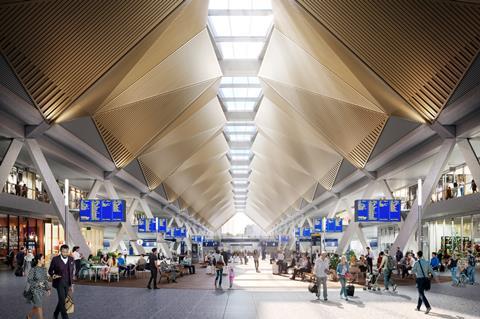Cuts to scheme could also reduce passenger capacity between Birmingham and Manchester
Inflation experienced by the construction sector since 2019 could add as much as £10bn to the cost of the country’s biggest infrastructure project.
HS2 Ltd, the company responsible for delivering the high-speed rail project, currently expects phase one of the scheme to cost between £49bn and £56.6bn but due to government rules these figures continue to be calculated in 2019 prices.

Executive chairman Jon Thompson told the transport select committee on Wednesday that updating the price for inflation would add “somewhere between £8bn and £10bn” to the bill, bringing the expected cost to between £57bn and 67.6bn
“It is the government’s longstanding policy that infrastructure estimates are only updated at spending review points, that’s my understanding of it,” he said, explaining the continuing practice of recording costs at the pre-inflated level.
“That’s why we are still working to 2019 prices […] which is, to be frank with you, an administrative burden of some significance within the organisation, because all of the invoices we get we have to then deflate backwards to 2019 prices even though we are paying them in 2024 prices,” Thompson added.
He outlined four reasons for rising costs, the first of which being poor early-stage budgeting.
“The essential problem - and this is a systemic problem, it’s not just HS2 it is about large projects that the government funds - is that a budget needs to be set early on in order for an outline business case to be approved by government,” he said.
“That is based on very, very immature data – you don’t have a design, you haven’t procured anything, there is no detail on which you can cost anything.”
He said changes to scope, poor delivery on HS2 Ltd’s part and general inflation were the other main causes for cost increases.
>> HS2 cancellation could release capacity to supply chain, says T&T
>> HS2 eyeing 2030 completion date for Phase 1
“The scope of HS2 was changed significantly by a whole series of ministers, so much more of it was put through tunnels, which costs more than putting it through cuttings for instance,” said Thompson.
The executive chairman said he did not believe the scheme could be delivered for the £45bn that the rail minister claimed in his most recent six-monthly statement.
“The estimate will clearly come down from £49bn-£56.6bn, because you have taken Euston out,” he said.
“Whether it will come down by anything like what was quoted in Network North or not, I doubt”.
Thompson also explained that he “can’t guarantee” costs will not rise, due to the cost-plus contracts that HS2 Ltd are currently trying to renegotiate with contractors.
“There’s still incentives for the contractors to spend more money,” while these contracts are in place, he said.
MPs also quizzed Thompson on the capacity implications of cutting the second phase of the scheme.
Thompson admitted there were “a number of scenarios in which the number of seats between London and Manchester could go down”.
This is because planned station upgrades in Crewe and Manchester will no longer take place, meaning HS2’s 400m long trains will not fit in the existing stations.
Instead, HS2 trains will have to be configured at 250m long, which is roughly the same length as the Pendolino trains that currently run on the West Coast Main Line, but with fewer seats.
“It may of course be that somebody has a fantastic plan to resolve that, but I am not aware of it, so under the current scenario, unless you extend Piccadilly station or do something at Crewe as well, my understanding is there would be a reduction in the number of seats between London and Manchester,” said Thompson.



























No comments yet